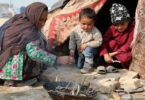KABUL (Agencies): The Taliban has tried to stem the flow of Afghans attempting to escape economic ruin and persecution. But, despite an official ban, the smuggling of undocumented migrants to neighboring Iran continues to rise with the help of Taliban border guards and officials willing to look the other way.
As Afghanistan’s economy collapses, its citizens continue to leave the country en masse in a trend that began to rise with the announced withdrawal of foreign forces in the spring of 2021 and which spiked after the Taliban seized power in August. Iran, a major destination country, has clamped down by beefing up security along its 900-kilometer border with Afghanistan and deporting tens of thousands of Afghans.
Taliban authorities in the southwestern province of Nimroz, which abuts Afghanistan’s borders with Iran and serves as a major migration hub, have banned human smuggling in an effort to stem the outflow. But smugglers tell RFE/RL’s Radio Azadi that the hurdles are nothing that cannot be overcome by bribing Taliban guards and officials willing to look the other way to keep business booming.
Mahmud, who provided only his first name, says he makes about $800 a month smuggling up to 150 people per week out of the country by way of an arduous and dangerous journey that starts in Zaranj, the capital of Nimroz, and eventually ends in Iran. Buses drop off thousands of Afghans a day in Zaranj, where the 36-year-old Mahmud awaits to shuttle them out of the country.
“We fit about 20 people in each vehicle, and the Taliban charges 1,000 afghanis (about $11) per car,” said Mahmud of his operation, which employs several workers and three vans.
“There are two roads there, one with a seven-hour walk and the other with a seventeen-hour walk,” Mahmud said. Upon reaching the Iranian border, more danger and bribes await on the other side, as well as a formidable border fence constructed by Iran about 15 years ago and heightened security ordered by Tehran after the Taliban takeover.
“Iranian cars are there, and they take passengers in their cars for 2 million [Iranian tomans, or about $65),” he said of the easiest way to cross into Iran. “There is another way, over the border wall, but many are injured and killed by border guards,” Mahmud added. “The way over the wall is very dangerous, and costs 7 million ($230).”
The Taliban, which has urged Afghans not to leave the country, has tried to cut off migration routes and authorities in Nimroz have issued bans against the smuggling of people to Iran. Mawlawi Sardar Mohammad Ayubi, the Taliban’s police chief in Nimroz, recently announced a local ban on illegal immigration in an audiotape released by the province’s Information and Culture Department.
Interior Ministry spokesman Abdul Nafi Takur, meanwhile, told Radio Azadi that he had officially sent a letter to all provincial police headquarters prohibiting the human-smuggling trade. “Orders have been issued to prevent illegal travel,” he said. The Taliban authorities did not respond to questions from Radio Azadi asking about reports that members of the Taliban were accepting bribes to circumvent the official orders.
From April 9 to May 6, nearly 230,000 Afghans flowed out of the country, mostly bound for neighboring Iran, according to the latest statistics from the UN’s International Organization for Migration (IOM). In the past year, more than 1.6 million Afghans crossed into Iran, according to the IOM, the vast majority of them undocumented migrants who seek work there or who intend to use Iran as a jumping-off point to migrate to Turkey and Europe.
Iran, which is mired in its own economic crisis amid skyrocketing inflation and rising food prices, has expressed alarm at the number of undocumented Afghans on its soil, putting the number at some 5 million people. Shortly after the Taliban took power in Kabul, Iran’s Interior Ministry announced that it would no longer allow entrance to Afghan refugees, citing difficult economic conditions. Since then, Tehran has deported tens of thousands of undocumented Afghans.
According to IOM statistics, the number of Afghans moving from Iran to Afghanistan was only slightly lower than the number of Afghans moving to Iran from May 2021 to April 2022, and has at times exceeded the figure. In April, for example, more than 91,000 Afghans moved from Iran to Afghanistan compared to 45,000 Afghans moving from Afghanistan to Iran. Of the 6,922 Afghans who returned to Afghanistan from Iran from April 30 to May 6, according to the IOM, 3,910 were deported. On May 26, Afghanistan’s Hasht-e Subh daily cited local sources in Nimroz Province as saying that 7,000 migrants had been deported from Iran in the past week, including 257 families. Ahmad Khaledi, a 26-year-old resident of Afghanistan’s northern province of Sar-e Pol, is among those who was successfully smuggled to Iran.
He told Radio Azadi that he paid a small fortune in his quest to work in Iran. “I had 50,000 afghanis ($590) with me and I wanted to go to Iran,” Khaledi said, adding that when he approached a smuggler he was told that “for Iran you must pay 5 million Iranian tomans ($164).” He made the payment and began his exodus by car, but was caught by the Taliban along the way and had to pay a bribe to be allowed to continue.
Eventually, he reached the southeastern Iranian city of Zahedan, just kilometers from the border, and from there he eventually moved on to the Iranian capital, Tehran. Not everyone is so lucky. Some illegal migrants have been detained, beaten, or even killed along the way by criminal gangs and border guards. And even if they do reach Iran, they have no legal status and face the stark reality that they may be sent back to the place they were trying to flee at great cost.
Massud, a farmer in the northern province of Kapisa who only gave Radio Azadi his first name, sold his cows and calves to pay smugglers in Nimroz Province for his ticket out of Afghanistan. He made it to Iran, he said, but “we encountered a lot of problems on the way.” After paying a smuggler in Iran to get him to the central city of Isfahan, he got a factory job through a contact. But Massud says he returned to Afghanistan empty-handed after he was caught by Iranian police and deported.






